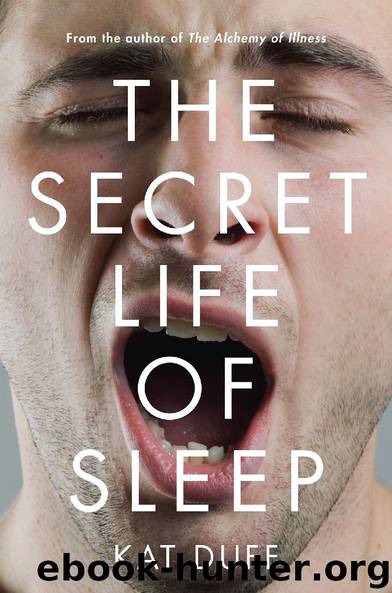Secret Life of Sleep by Kat Duff

Author:Kat Duff
Language: eng
Format: epub
Publisher: Atria Books / Beyond Words
11
KNITTING UP THE “RAVELED SLEAVE OF CARE”: EMOTIONAL RESTORATION
I was running as fast as I could down the mountainside, but the Wicked Witch of the West from The Wizard of Oz was right behind me, her black cape and hair flying behind her in the wind, driving a bright red convertible, top down. It was inevitable: the witch would catch me, and I would be done for. This is the earliest dream I remember, and it prompted the only time that I remember charging into my parents’ bedroom screaming and waking them to comfort me. More than two thousand years ago, the Greek philosopher Aristotle described dreams as “echoes of emotionally charged sense-perceptions from daily life.” 1 While I do not recall what happened the day before my nightmare, I do remember the thrill and terror I felt every year I watched the famous movie on television with my siblings, each of us frozen in our spots on the carpet in front of the big black box.
Sleep researchers have begun to confirm Aristotle’s notion that we carry the emotional concerns of our days into our nights. As Shakespeare noted, sleep “knits up the raveled sleave of care.” That may seem obvious to many, but the emerging consensus has evoked a renaissance in scientific thinking about the role that sleep and dreams play in managing the emotions that get the better of us by day. Not long ago, many scientists believed that dreams were nonsense, vestigial “by-products” of sleep, “random firings” of a nervous system in sleep mode, something like the screen savers on our computers, or the feeble attempts of our forebrains to make sense out of those firings. 2
People who monitor their dreams often note that they have a way of picking up on passing anxieties from the previous day and enlarging them, as if placing them under a microscope. 3 Veiled criticisms, near disasters, and offhand comments we may have overlooked at the time are evoked through emotion-laden images and matched with older memories, at times revealing unseen patterns. Occasionally, we wake understanding something that eluded us the night before—that someone has been lying to us, for instance, or it’s time to get our blood sugar levels checked. As the Bulgarian author Elias Canetti allegedly once noted: “All the things one has forgotten scream for help in dreams.”
Furthermore, sleep selectively recalls the emotionally arousing incidents of our days over the neutral, matter-of-fact ones. 4 The arousal of our fight-or-flight sympathetic nervous systems apparently marks these experiences for review. From this fact alone, it would seem that our dreaming brains just make things worse by focusing on the negative. However, subsequent rounds of REM sleep over the course of one or several nights usually function to reduce the visceral autonomic charge that accompanies these frightening or enraging experiences, helping us to put them to rest.
Rosalind Cartwright followed the dreams of twenty recently divorced men and women, half of whom met the criteria for depression, over five months. She discovered
Download
This site does not store any files on its server. We only index and link to content provided by other sites. Please contact the content providers to delete copyright contents if any and email us, we'll remove relevant links or contents immediately.
When Breath Becomes Air by Paul Kalanithi(7261)
Why We Sleep: Unlocking the Power of Sleep and Dreams by Matthew Walker(5640)
Paper Towns by Green John(4169)
The Immortal Life of Henrietta Lacks by Rebecca Skloot(3826)
The Sports Rules Book by Human Kinetics(3587)
Dynamic Alignment Through Imagery by Eric Franklin(3488)
ACSM's Complete Guide to Fitness & Health by ACSM(3467)
Kaplan MCAT Organic Chemistry Review: Created for MCAT 2015 (Kaplan Test Prep) by Kaplan(3422)
Introduction to Kinesiology by Shirl J. Hoffman(3299)
Livewired by David Eagleman(3121)
The River of Consciousness by Oliver Sacks(2992)
Alchemy and Alchemists by C. J. S. Thompson(2911)
The Death of the Heart by Elizabeth Bowen(2901)
Descartes' Error by Antonio Damasio(2731)
Bad Pharma by Ben Goldacre(2727)
Kaplan MCAT Behavioral Sciences Review: Created for MCAT 2015 (Kaplan Test Prep) by Kaplan(2491)
The Gene: An Intimate History by Siddhartha Mukherjee(2491)
The Fate of Rome: Climate, Disease, and the End of an Empire (The Princeton History of the Ancient World) by Kyle Harper(2435)
The Emperor of All Maladies: A Biography of Cancer by Siddhartha Mukherjee(2430)
